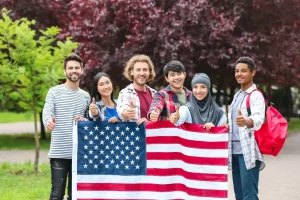
Why the U.S. Remains the Top Choice for International Students in 2025
Home Blog Why the U.S. Remains the Top Choice for International Students in 2025 By Rahul | U.S. Student Visa Specialist A Closer Look at
On Tuesday, May 27, 2025, the U.S. State Department directed all U.S. embassies and consulates worldwide to pause new appointments for F, M, and J visa categories. This suspension aims to implement expanded social media screening protocols for student and exchange visa applicants. While appointments already scheduled will proceed, new applicants face indefinite delays pending further guidance from the State Department.
The Trump administration cites national security concerns as the rationale for this policy shift. The expanded screening will scrutinize applicants’ social media activity over the past five years, focusing on content deemed antisemitic, extremist, or anti-American. This move follows recent actions against institutions like Harvard University, which faced revocation of its certification to enroll international students due to alleged non-compliance with federal mandates.
Immediate Impact:
Academic and Financial Consequences:
Broader Implications:
Currently, the pause on new visa appointments is in effect with no specified end date. The State Department has not provided a timeline for the implementation of the expanded screening or the resumption of visa services. Legal challenges may arise, as stakeholders question the abruptness and implications of this policy shift.
The situation remains fluid. While the State Department has not issued a clear timeline for resuming new visa appointments, prospective students should take proactive steps to stay prepared and minimize disruptions.
Here’s what you can do:
This development is part of a broader trend of increased scrutiny on international students and academic institutions. The expanded social media screening raises concerns about privacy, freedom of expression, and the potential for discriminatory practices. As the U.S. reevaluates its immigration and education policies, the global academic community watches closely, considering the implications for international collaboration and knowledge exchange.
For real-time updates and assistance with F-1 visas, OPT, CPT, or other immigration-related concerns, feel free to reach out: +1 (510) 876-0888, [email protected]. Share this article with fellow students and professionals to help them stay informed and successfully respond with these new visa challenges.
Note: This article is based on current information as of May 28, 2025. Policies and procedures are subject to change; always refer to official sources for the most accurate guidance.

Home Blog Why the U.S. Remains the Top Choice for International Students in 2025 By Rahul | U.S. Student Visa Specialist A Closer Look at

Home Blog Harvard vs. Trump Administration: The Battle Over International Student Enrollment What Happened? On Thursday, May 22, 2025, the Trump administration abruptly revoked Harvard

Home Blog How a U.S. MPH Degree Can Transform Your Global Public Health Career For professionals in life sciences, medicine, pharmacy, nursing, dentistry, or allied